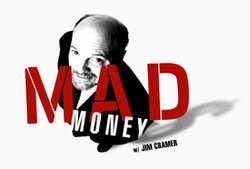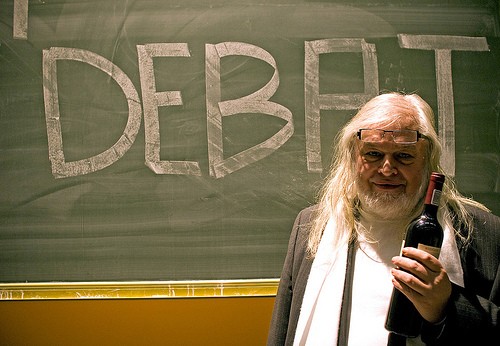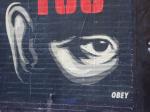Un document à posséder pour argumenter lors des séminaires de l'école des cadres ! Bien sûr, cum grano salis, comme pour toutes les publications parisiennes qui véhiculent toujours des germes délétères de jacobinisme, l'idéologie de la terreur qui a justement généré le libéralisme !
En kiosque depuis quelques semaines, un très intéressant numéro du bimensuel Manière de Voir (numéro de décembre-janvier) consacré au krach du libéralisme.
Mei ‘68: een liberale revolutie
 Meestal worden de schermutselingen die in mei 68 plaatsvonden omschreven als een revolutie. Het feit dat duizenden studenten op straat kwamen in de verschillende Europese grootsteden had inderdaad iets weg van een revolutionaire beweging, maar een echte revolutie - zoals de progressieve krachten die meestal omschrijven - was het niet. Achter de schermen was echter wel degelijk een revolutionaire transformatie aan de gang.
Meestal worden de schermutselingen die in mei 68 plaatsvonden omschreven als een revolutie. Het feit dat duizenden studenten op straat kwamen in de verschillende Europese grootsteden had inderdaad iets weg van een revolutionaire beweging, maar een echte revolutie - zoals de progressieve krachten die meestal omschrijven - was het niet. Achter de schermen was echter wel degelijk een revolutionaire transformatie aan de gang.
Het was de transformatie van nationaal kapitaal en nationale elite naar een supranationaal kapitaal en de daar bijhorende op internationalistische leest georiënteerde elite. De revolutionaire transformatie van nationale staten naar superstaten. In feite waren er twee verschillende machtsgroepen van de elite in de toenmalige maatschappij actief die niet meer compatibel waren met elkaar en dus onvermijdelijk met elkaar in conflict moesten komen.
Enerzijds was er door de USA terug op de been gebrachte nationale politieke en economische elite en anderzijds waren er bepaalde delen van die elite die inzagen dat het voor een verdere expansie en financiële macht noodzakelijk was om tot een volgende fase van het liberaalkapitalisme over te gaan. Paradoxaal werden deze in kapitalistische zin progressieve krachten gedreven door dezelfde USA die eerst de oude nationale elites weer op de been had geholpen, maar nu vaststelde dat die oude elite in de weg stond van een tweede – dit keer – meer globaal georiënteerde goederen- en kapitaalmarkt.
De tweede globalistische golf was in aantocht. De eerste was nog op ouderwets kolonialisme gestoeld. De tweede golf zou echter een moderne variant van het kolonialisme voortbrengen. De supranationale bedrijven en financiergroepen zouden grote stukken van de zogenaamde vrije wereld gaan overspannen en zo hun wil opleggen aan die wereld. Het andere deel van de wereld werd ingepalmd door het staatskapitalisme van de Sovjet-Unie, waar de concentratie van kapitaal en productiemiddelen al volledig geïntegreerd en gecontroleerd werd door de staatskapitalistische elite.
Om de nieuwe noden van de op de USA gerichte elite in te vullen moest eerst afgerekend worden met sommige hinderlijke barrières in de verschillende oude nationale staten. Tol- en paspoorthindernissen moesten weg, vrij verkeer van kapitaal was een andere noodzakelijke voorwaarde om tot wereldwijde investeringen te kunnen overgaan en om nationale industrieën te kunnen verkopen aan de grootste bedrijven in de wereld, die voornamelijk in handen zijn van US-kapitalisten. Eigenlijk stonden alle op nationale staten en identiteiten gestoelde instellingen in de weg van de globalistische nieuwe elite.
Tegen deze achtergrond waren er in 1968 in de meeste grote Europese steden studentenonlusten. De opkomende elitaire jeugd had nood aan een vrijere maatschappij. Zij wilde op haar beurt de oude elite met haar nationalisme en op familie en gezin gerichte maatschappij aan de kant zetten. De studenten wilden een liberale maatschappij die men als een vrije maatschappij zag en waar zij als nieuwe machtsgroep mee de agenda zouden kunnen bepalen. Dat het een linkse revolte zou zijn geweest werd zelfs betwist door de grote linkse organisaties in die tijd, zoals de communistische partijen en de linkse vakbonden. Die grote arbeidersorganisaties spraken dan ook over burgerlijke avonturiers en provocateurs, als zij het over de kabaal makende studenten hadden. De oude linkse organisaties zagen toen zeer duidelijk het gevaar in van het opheffen van nationale entiteiten en hebben zich verzet tegen de liberale eisen van de studenten.
De opkomende studerende elite had echter lessen getrokken uit de kortstondige liberale revolutie. Een zeer kleine groep sloot zich aan bij het kamp van de staatskapitalistisch georiënteerde maatschappijvorm. Dit waren vooral de toen opkomende maoïstische kernen. Maar het overgrote deel van de elitaire jeugd had ingezien dat zij beter de macht kon grijpen via de instellingen. Zij wisten zich toen al gesteund door dat deel van de machtskaste in de Europese landen dat die liberale transformatie nodig had. De elite besefte dat men alleen via een groot propagandaoffensief de mensen en de oude elite zover zou kunnen krijgen om de revolutionaire maatschappelijke veranderingen te aanvaarden
De kopstukken van de mei 68 beweging werden gretig opgenomen in de mediawereld en anderen nestelden zich massaal in het onderwijs en in allerlei bedrijven die op de een of andere manier aan publieksbeïnvloeding doen, zoals reclamebureaus en maatschappelijke onderzoeksinstituten. De media waren echter het infiltratiekanaal bij uitstek van de liberale studentenelite die de onlusten van mei ‘68 over heel Europa had georganiseerd. En of deze media zich nu progressief noemde of liberaal dat maakte niks uit, want deze media waren en zijn in feite grote bedrijven en die zijn op hun beurt nog eens verbonden met andere concerns.
De media brengen een product op de markt. De markt zijn de adverteerders (andere bedrijven). Het product is het publiek. De elitemedia zijn diegenen die de grote lijnen bepalen waaraan hun product, de mensen, zich moeten aanpassen of conformeren. De elitemedia zijn de spreekbuis van conglomeraten die hun klanten een bepaald wereldbeeld voorhouden. Dat wereldbeeld weerspiegelt de voorgenomen en bekrompen belangen en waarden van die elite en hun directe subelite. De culturele beleidsmarkers en managers van dat mediale propaganda-apparaat (redacteuren, columnisten, enz.) hebben dezelfde groepsbelangen en vertoeven in dezelfde kringen als staats- en bedrijfsleiders. Er bestaat in feite een regelmatig verkeer van hooggeplaatste personen die pendelen tussen de bedrijven, de regering en de media. Zo maken de media regelrecht deel uit van de machtsstructuren. In ruil voor die machtsdeling moeten de media-eigenaars met de autoriteiten samenwerken en gehoorzamen tot zelfs onderdanig zijn aan die autoriteiten.
De media vormen op zich slechts een onderdeel van een groter doctrinair systeem. Andere delen zijn de opiniebladen, scholen en universiteiten, de academische wereld en de culturele sector. Dat doctrinaire systeem – de producenten van wat we gerust een propagandaproduct kunnen noemen – heeft echter twee verschillende doelgroepen. De eerste kunnen we de politieke bewuste klasse noemen: de pakweg 15% van de bevolking die behoorlijk geschoold en mondig kan worden genoemd en dus een rol speelt bij de besluitvorming. De resterende 85% van de bevolking kunnen we de te misleiden kudde noemen. Deze grote groep wordt verondersteld de bevelen op te volgen van de machtselite en niet in de weg te lopen van die elite. Zij zijn de doelgroep van de echte massamedia, de roddelpers, de infantiele tv-feuilletons, de sportpagina’s en sportprogramma’s.
Deze sectoren van het doctrinaire liberale systeem moeten het plebs vermaken en de nieuwe elementaire liberale waarden versterken: de passiviteit, de onderdanigheid aan het gezag, de deugd van de hebzucht, de cultus van het ego en het individuele belang, de desinteresse voor politiek en maatschappelijke waarden en de diabolisering van ingebeelde vijanden (zoals het AFF en Blokbuster zo ijverig doen). Het doel is om de massa blijvend te kunnen misleiden en te conditioneren. Er wordt een schijnwaarheid en een schijnwereld gecreëerd. Want als de massa teveel de realiteit zou zien, dan zouden ze die realiteit wel eens kunnen willen veranderen en dat mag niet. Zo is het mogelijk gebleken dat een studentengeneratie die van zichzelf beweerde dat ze progressief was uiteindelijk hand- en spandiensten levert aan een van de meest nivellerende ideologische concepten van onze tijd: het marktliberalisme en het consumptienihilisme.
De massa is niet bevrijd. Ze is nu meer dan ooit verknecht door de ketens van materieel verlangen en consumptiedrift. Het politieke en maatschappelijke engagement dat voor mei ‘68 bestond, is door de jaren heen vernietigd en in alle geïndustrialiseerde staten tot nul herleid. De staten zijn opgeslorpt of ondermijnd door big business. De volkeren zijn geïnfiltreerd door massa’s vreemde mensen en culturen. De mei-’68-activisten hebben geen linkse progressieve revolte in gang gezet. Links is niet versterkt uit de strijd gekomen, maar heeft integendeel meegeholpen om het sociale thema en de sociale cohesie af te breken. Mei ‘68 is het begin van het einde van links. Mei ‘68 is het scharniermoment waarop een gevaarlijke, dominante en onverdraagzame doctrine aan zijn opmars is begonnen: de culturele dictatuur van het globale en eendimensionale kapitalisme.
Eddy Hermy





 del.icio.us
del.icio.us
 Digg
Digg.JPG)

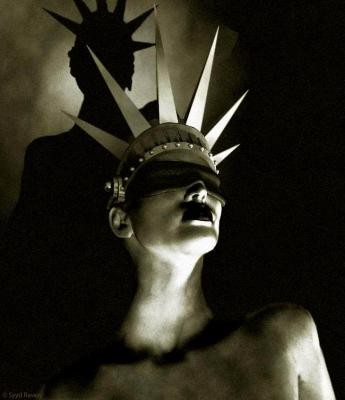
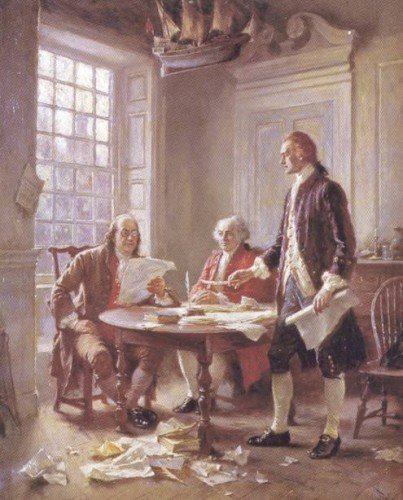
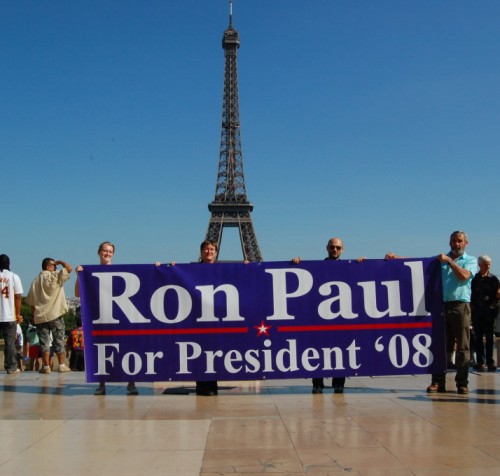
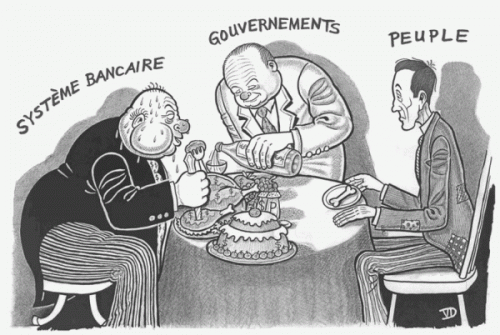
 « La tourmente financière mondiale et ses répercussions sur l'économie réelle risquent de créer 20 millions de nouveaux chômeurs dans le monde d'ici à la fin 2009, a prévenu, lundi 20 octobre, le directeur général du Bureau international du travail (BIT), Juan Somavia. Selon des estimations du BIT, "le nombre de chômeurs pourrait passer de 190 millions en 2007 à 210 millions fin 2009", a indiqué M. Somavia lors d'une conférence de presse, ajoutant que ces chiffres pourraient s'aggraver en fonction de l'impact de la crise sur l'économie réelle. "Cela serait la première fois dans l'histoire", a-t-il ajouté, prévenant que ce chiffre pourrait même s'aggraver en fonction de l'impact de la crise sur l'économie réelle.
« La tourmente financière mondiale et ses répercussions sur l'économie réelle risquent de créer 20 millions de nouveaux chômeurs dans le monde d'ici à la fin 2009, a prévenu, lundi 20 octobre, le directeur général du Bureau international du travail (BIT), Juan Somavia. Selon des estimations du BIT, "le nombre de chômeurs pourrait passer de 190 millions en 2007 à 210 millions fin 2009", a indiqué M. Somavia lors d'une conférence de presse, ajoutant que ces chiffres pourraient s'aggraver en fonction de l'impact de la crise sur l'économie réelle. "Cela serait la première fois dans l'histoire", a-t-il ajouté, prévenant que ce chiffre pourrait même s'aggraver en fonction de l'impact de la crise sur l'économie réelle.
